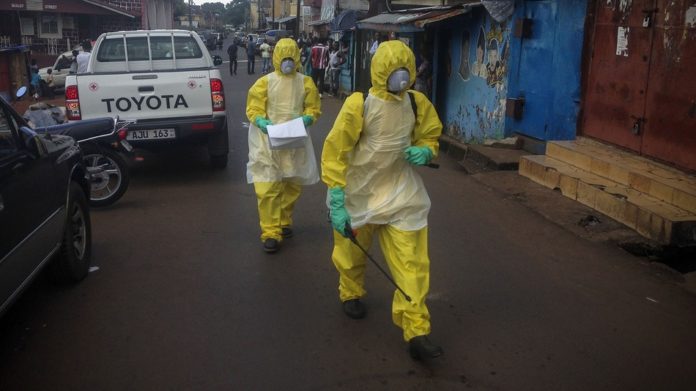‘Ebola is spreading before our eyes’: A week in Devil Hole, Sierra Leone

DEVIL HOLE, Sierra Leone—She is under the large tree at the north end of the village. Everyone knows it.
Lying there in the dirt, blood oozing from the corner of her mouth. Occasionally her hands reach out, fingers spreading in the dirt in response to the pain. The equatorial sun blazes down and the villagers can do nothing.
We can do nothing.
We are in Devil Hole, a poor village barely 40 minutes drive from the Sierra Leonian capital Freetown and Ebola is spreading before our eyes. Already, the virus has claimed the lives of at least 5,160 people and Sierra Leone has been hard hit.
The woman under the tree doesn’t even have strength to raise her head to drink from a small water bottle.
She is Amanata Gbondo. She is one of three wives of Osman. He is lying on the other side of the main road. He is dead.

The body of Osman Gbondo, a victim of Ebola, Sierra Leone.
Image: Alex Thomson
A policemen approaches, notebook in hand, softly calling to her:
“Amanata….Amanata…Can you hear me Amanata?”
No response.
The villages are aghast at the officer’s courage — or foolhardiness — in getting so close to someone with Ebola.
Osman and Amanata are not alone. A short distance away sits Mohamed Kamara and his wife Kadyatu. Both appear sick. Mohamed has the bloodshot eyes of someone in the throes of the virus.
Again the villagers form a circle at what they consider a safe distance. They can offer reassurance but little else. For five hours they have been calling the 117 emergency hotline number but no ambulance comes.
“We are suffering here and we call 117 and nothing happens,” says Yunis Kamara, a youth worker here. “They do nothing for us.”

A poster in Sierra Leone, warning residents about Ebola.
Image: Alex Thomson
Worse still, the villagers tell us that Osman did not die by the roadside but in a house in the village. At least two men carried his body, without protection, to where he now lies, attracting the first of the flies.
The men have fled up the hill into the bush. Villagers know they should be traced. But how? They know that a corpse is an Ebola time-bomb but the deed is already done. Two more potential infection sources are now out there — on the run.
We return to Devil Hole the following day. Osman’s body has been picked up by the Red Cross. Now, though, there is another body — his wife Amanata.
She had struggled, convulsing in the dirt of Devil Hole in the last terrible stages of the virus the previous night, before her agony finally gave way to death.

Amanata Gbondo, a victim of ebola in Sierra Leone
Image: Alex Thomson
There was no comfort in the hours of her protracted death. Nobody could help. Nobody could touch her. It was a long, lonely agony.
Half-naked, she now lies bereft of any dignity in the blazing heat.
I wonder if Mohamed, who lies a short distance away in the street, will succumb to the same terrible fate as villagers look on in horror, frustration and anger?
On Wednesday morning, as we come back to Devil Hole, we see him lying in the street. He is dead, too, oozing lethal fluids into the dirt as chickens peck away at him.

Names of those infected by Ebola, Sierra Leone.
Image: Alex Thomson
The Ebola Command and Control Centre in Central Freetown an hour away feels like another universe. Chlorine washes at the front door. Computers hum in what was the British Council theatre until Ebola stole the show.
This is where they take 117 calls and — in theory at least — dispatch ambulances to the western region of Sierra Leone where Amanata and Mohamed died. Except, they don’t.
The walls tell an awful truth. Boards list name after name after name of people known to be infected. But they cannot be picked up for one simple reason: there are no available beds.
The United Nations estimates that at least 1,800 beds will be needed by December. There are only about 550 now — it could take weeks, maybe months, before more beds will be available.
Meanwhile the terrible scenes in the streets of Devil Hole will continue.
Alex Thomson is Chief Correspondent at Channel 4 News. In more than 25 years, he’s covered over 20 wars; led major investigations and continues to front the program from around the world. An award-winning journalist, he has written two books about the 1991 Gulf War and a travelogue about cycling across India.
Have something to add to this story? Share it in the comments.
